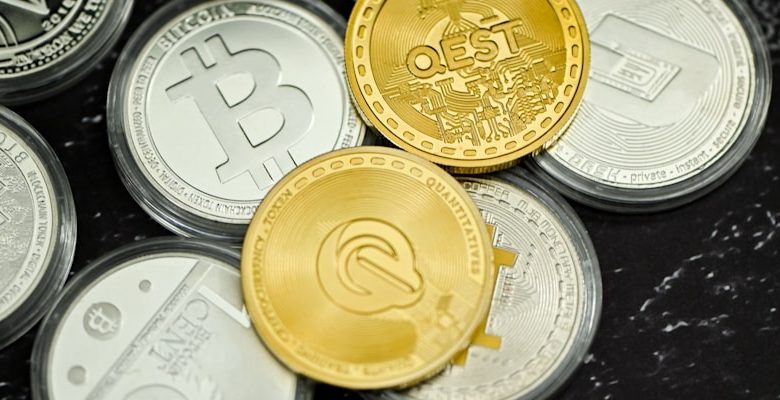What Is Decentralized Finance (DeFi), and Why Does It Matter?

- Understanding the basics of Decentralized Finance (DeFi)
- The rise of DeFi: A game-changer in the financial world
- Exploring the key features of DeFi platforms
- Why traditional banking systems are being disrupted by DeFi
- The potential benefits and risks of participating in DeFi
- How DeFi is reshaping the future of finance
Understanding the basics of Decentralized Finance (DeFi)
Decentralized Finance (DeFi) is a revolutionary concept in the financial world that aims to eliminate traditional intermediaries like banks and brokers. Instead, DeFi utilizes blockchain technology to create a peer-to-peer financial system that is transparent, secure, and accessible to anyone with an internet connection.
One of the key aspects of DeFi is the use of smart contracts, which are self-executing contracts with the terms of the agreement directly written into code. These smart contracts automate processes that would typically require manual intervention, such as lending and borrowing, trading, and asset management.
Decentralized applications (DApps) play a crucial role in the DeFi ecosystem, providing users with platforms to access various financial services without the need for a central authority. These DApps are built on blockchain networks like Ethereum, which offer a high level of security and immutability.
Overall, DeFi presents a paradigm shift in the way we think about finance, offering greater financial inclusion, lower costs, and increased efficiency. As the DeFi space continues to grow and evolve, it is essential for individuals and institutions to understand the basics of this innovative technology and its potential impact on the future of finance.
The rise of DeFi: A game-changer in the financial world
Decentralized Finance (DeFi) has been making waves in the financial world, offering a new way of conducting transactions, accessing financial services, and managing assets. DeFi utilizes blockchain technology to create a system where financial activities can be executed without the need for traditional intermediaries such as banks or brokerages.
One of the key aspects of DeFi is its emphasis on transparency and accessibility. By leveraging smart contracts on the blockchain, users can interact directly with decentralized applications (dApps) to lend, borrow, trade, or invest their assets. This level of transparency not only reduces the risk of fraud but also provides users with greater control over their finances.
Furthermore, DeFi is known for its permissionless nature, meaning that anyone with an internet connection can participate in the ecosystem. This opens up a world of opportunities for individuals who may not have had access to traditional financial services due to geographical constraints or lack of documentation.
Overall, the rise of DeFi represents a significant shift in the way we think about finance. By decentralizing financial services, DeFi has the potential to democratize access to capital, increase financial inclusion, and ultimately reshape the global economy.
Exploring the key features of DeFi platforms
When exploring the key features of decentralized finance (DeFi) platforms, it is essential to understand the various components that set them apart from traditional financial systems. DeFi platforms operate on blockchain technology, allowing for peer-to-peer transactions without the need for intermediaries such as banks or brokers.
One of the primary features of DeFi platforms is the ability to access financial services without the need for a central authority. Users can participate in lending, borrowing, trading, and other financial activities directly through smart contracts, which are self-executing agreements coded on the blockchain.
Another key feature of DeFi platforms is the concept of total transparency. All transactions and data on the blockchain are visible to anyone, ensuring accountability and security. This transparency also allows for greater trust among users, as they can verify the integrity of the platform themselves.
Furthermore, DeFi platforms offer a high level of interoperability, meaning that different applications and protocols can seamlessly connect and interact with each other. This interconnectedness allows for a more robust and dynamic ecosystem where users can access a wide range of financial services.
In conclusion, the key features of DeFi platforms include decentralization, transparency, and interoperability. These characteristics not only differentiate DeFi from traditional finance but also pave the way for a more inclusive and accessible financial system for users worldwide.
Why traditional banking systems are being disrupted by DeFi
Traditional banking systems are facing disruption from the rise of decentralized finance (DeFi) for several key reasons. First, DeFi eliminates the need for intermediaries such as banks, allowing users to interact directly with financial services using blockchain technology. This disintermediation reduces costs and speeds up transactions, making DeFi more efficient than traditional banking systems.
Second, DeFi offers greater accessibility to financial services for individuals who are underserved or unbanked by traditional institutions. Anyone with an internet connection can participate in DeFi, opening up opportunities for financial inclusion on a global scale. This democratization of finance challenges the exclusive nature of traditional banking systems.
Furthermore, DeFi operates on open and transparent protocols that are accessible to anyone, enabling greater trust and security compared to traditional banking systems. Smart contracts, which are self-executing agreements on the blockchain, automate processes and remove the need for human intermediaries, reducing the risk of fraud and manipulation.
Overall, the disruptive nature of DeFi lies in its ability to provide a more efficient, accessible, and secure alternative to traditional banking systems. As the DeFi ecosystem continues to evolve and expand, it is likely to reshape the financial industry and challenge the dominance of traditional banks in the years to come.
The potential benefits and risks of participating in DeFi
Participating in Decentralized Finance (DeFi) can offer numerous advantages, but it also comes with its fair share of risks that potential participants should be aware of. Below, we outline some of the potential benefits and risks associated with engaging in DeFi:
- Benefits: Participating in DeFi can provide individuals with greater financial freedom and control over their assets. By eliminating the need for intermediaries such as banks, DeFi allows users to access financial services directly through decentralized applications. This can result in lower fees, faster transactions, and increased accessibility to financial products for individuals who may not have had access to traditional banking services.
- Risks: Despite the potential benefits, participating in DeFi also comes with risks that users should consider. Smart contract vulnerabilities, hacking attacks, and the lack of regulatory oversight are some of the main risks associated with DeFi. Users should exercise caution when interacting with DeFi protocols and ensure they understand the risks involved before committing their assets.
In conclusion, while DeFi has the potential to revolutionize the traditional financial system, it is important for users to weigh the benefits against the risks before participating. By staying informed and practicing good security measures, individuals can take advantage of the opportunities presented by DeFi while minimizing the associated risks.
How DeFi is reshaping the future of finance
Decentralized Finance (DeFi) is revolutionizing the traditional financial system by providing a more inclusive, transparent, and efficient way of conducting transactions. Unlike centralized financial institutions, DeFi operates on a peer-to-peer network, allowing users to interact directly without the need for intermediaries such as banks or brokers. This not only reduces costs but also minimizes the risk of censorship or manipulation.
One of the key ways in which DeFi is reshaping the future of finance is through smart contracts. These self-executing contracts are coded to automatically perform specific functions when predefined conditions are met. This eliminates the need for third-party oversight and streamlines processes such as lending, borrowing, trading, and asset management.
Another significant aspect of DeFi is liquidity provision. By pooling funds from multiple users, DeFi platforms create a more liquid market, allowing for faster and more efficient trading. This increased liquidity benefits both traders and investors by reducing slippage and improving price discovery.
Furthermore, DeFi opens up new opportunities for financial innovation and experimentation. Developers can build decentralized applications (dApps) on blockchain networks, creating a wide range of financial products and services that were previously unavailable in the traditional financial system. This fosters a more dynamic and diverse ecosystem that encourages continuous growth and evolution.



